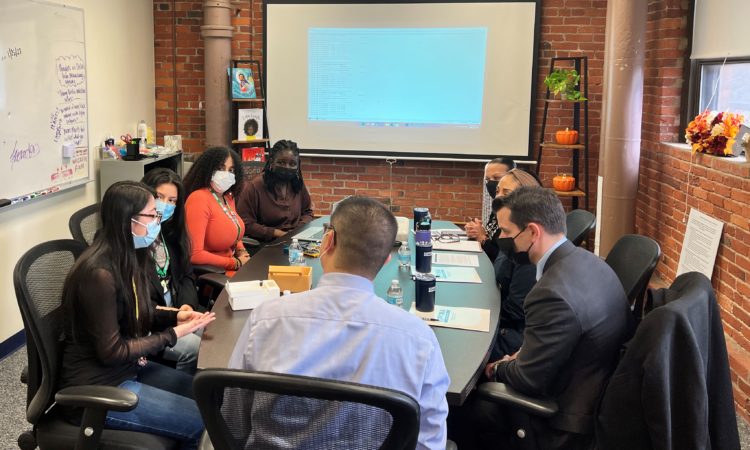
(Lynn, MA) Back in December, we shared the news of KIPP Academy Lynn Collegiate’s Engineering Team making it to nationals for Samsung’s Solve for Tomorrow Challenge.
The team has had a busy three months since learning that the plan that they had developed for an Air Quality Measurement Device would become a reality. What started as an outline for a device, with hopes of creating a working prototype, turned into a larger conversation that the students began to have about women in STEM, poor air quality in communities of color, and how their challenge to Solve for Tomorrow would open up new doors.
The project started out after KALC Science and Engineering Teacher and Instructional Coach, Allen Wang began looking into the Samsung Solve for Tomorrow Challenge. Wang and a team of three students had done the competition back in 2019 so the competition itself wasn’t new to him. Flory Mendez-Merida, a 10th grader and eventual Team Leader, learned about what Mr. Wang was looking into and that led to the conversation of air quality awareness.
After being named a state winner, the team got to work. Originally, they had outlined a 6 week plan that would give them a working prototype by mid-February. When COVID cases spiked across the state, KIPP MA made the decision to shift to virtual learning for a week, around the same time that Samsung pushed the date back for the competition. The team did not take these as roadblocks, but rather a chance to further research and understand what affects air quality conditions.
The team, who now calls themselves The AQA Team (air quality awareness), began to grow. What started out as four young women grew by five other KALC students who learned about the project and wanted to help. The team leaders, Esther Agbedun, Flory Mendez-Merida, Iris Guzman De Leon and Lia Haile Mekonnen were joined by Angel Frias, Alejandro Nina Duran, Darren Ath-Ly, Neidy Merida-Lopez, and Rahmatullah Trawalley. The growing team added to the conversation the students were having about what it meant to be a woman in STEM. Though males were involved in the project and part of the team, the group was still female dominant, something that is not seen in STEM in high schools, colleges, or careers. The team adopted the hashtag #Girlbosses+guys to remind themselves that to dream for a career in STEM as a woman is not unheard of, but to also include and acknowledge that the males on the team were contributing as well.
Through their research, The AQA Team began designing their air quality device, using the engineering design process. This process included the team learning how to program an Arduino with code, connect a particulate matter sensor and solder together wires. This process was not a quick one and the team learned much about the process through systematic trial and error. The AQA Team developed a working prototype and also used Onshape, a 3D design software, to design a case for the prototype to be carried in.
After completing the prototype, the team invited Mr. Jared Nicholson, the newly elected mayor of Lynn, to visit campus and learn more about their prototype and the data they had collected. They were able to show Mayor Nicholson that their prototype collected data that showed there were areas in Lynn near residential areas that did not consistently have good air quality. Sharing this data with Mayor Nicholson sparked the team to have a conversation with the mayor to advocate for electric trains, more green space, and sharing their data with the city of Lynn on a larger scale.
The final step for The AQA Team was to create a social media platform and website where they could reach a wider audience, specifically their peers in Lynn. The Instagram page (using the hashtag #GirlBosses+guys) documents the team through picture and video testing around the city of Lynn.
At the end of the project, The AQA Team had a working prototype, opened up conversations with public officials about air quality, and shared their data and findings with a larger audience. Though The AQA Team was not selected to move on to the final round, (the competition went from 100 schools to a mere 10), the team is still hopeful for the future of their device and looking to next year’s competition.
What started as a conversation between Mr. Wang and team lead Flory quickly turned into a project that has the potential to make a difference in the city of Lynn and surrounding areas and that is the definition of Solving for Tomorrow.
The AQA Team
Esther Agbedun, 10th Grader, Team Leader
Flory Mendez-Merida, 10th Grader, Team Leader
Iris Guzman De Leon, 11th Grader, Team Leader
Lia Haile Mekonnen, 11th Grader, Team Leader
Angel Frias, 10th Grader
Alejandro Nina Duran, 10th Grader
Darren Ath-Ly, 10th Grader
Neidy Merida-Lopez, 10th Grader
Rahmatullah Trawalley, 10th Grader
Allen Wang, KALC Faculty Advisor